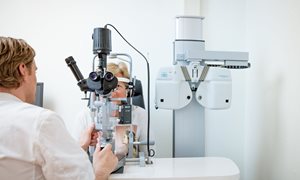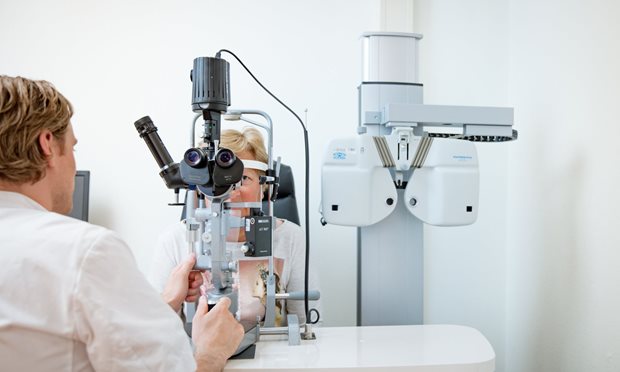

About the Radboudumc center of expertise
The center Hereditary blindness offers specialized diagnostics and care to people with a hereditary retinal disorder and conducts leading scientific research into these (rare) diseases. read moreAbout the Radboudumc center of expertise
The center of expertise in Hereditary Blindness offers specialized diagnostics and care to people with a hereditary retinal disorder and conducts leading scientific research into these (rare) diseases. The center of expertise specializes in the following disorders: genetic retinal disorders, in particular Stargardt disease, choroid anaemia, central serous rheinopathy, Leber congenital amaurose, Usher disease and various forms of retinitis pigmentosa. We also specialize in the genetic component of more common disorders such as age-related macular degeneration and diabetic macular edema. For Usher's disease (hereditary deafness and blindness) we work closely with Radboudumc’s center of expertise in Hearing and Genes.At our center of expertise, you will find specialist multidisciplinary diagnostics, care and knowledge all under one roof. Our ophthalmologists and clinical geneticists specialize in the diagnosis of hereditary retinal disorders. Pioneering research into as-yet-unknown genetic causes of retinal diseases and the development of new treatments ensures that you are always helped in accordance with the latest scientific discoveries.
Currently, there are few to no options for treating genetic retinal disorders. However, at our center we conduct research into the development of new, upcoming treatments.
The center of expertise in Hereditary Blindness has been acknowledged by the Ministry of Public Health, Welfare and Sport.
Information only available in Dutch
It is important to be aware that most information about the expertise center can only be found on the Dutch-language website. This means that all relevant details are only available in Dutch. Visitors wishing to consult this information should visit the Dutch-language website to obtain complete and accurate information.
International patients
Everything you need to know as a foreign patient. Especially if you are not insured through the Dutch health care law.
read more

Your visit
Do you have an appointment with the ophthalmology department coming up soon? Read how to prepare yourself. more about your visitYour visit
If you have an appointment with one of our ophthalmologists, you can check in at the desk. In most cases, the optometrist carries out a preliminary examination. Then an ophthalmologist (in training) will examine you.
Your attending physician
We strive to ensure that you always meet with the same ophthalmologist. However, this is not always feasible. Our specialists work in the outpatients' clinic and in the regular clinic. And medical interns work for different departments during their training. As a result, you may meet with a different specialist during the course of your treatment.
Waiting time
Our consulting hours are by appointment. We do not know how many tests each patient will need in advance. Appointments may run long. Please keep in mind that you may have to wait a while before it is your turn.
FIRST VISIT
Where can you check in?
Is it your first appointment at Radboudumc? Then please register at the central registration desk near the main entrance before your appointment. You will be registered as a patient there. Then you can come to our department.
What to bring?
Certificate of insurance
Usually, the hospital sends the invoice directly to your health insurer. Are you not or insufficiently insured for treatment? Then the bill will be sent to you at home. You will have to pay before treatment can begin.
Identity card
Identification at hospitals is mandatory. You can identify yourself with your passport, driver's license or identity card.
Eye drops
For the examination of the internal eye, the ophthalmologist uses pupil-broadening drops. The exposure time of the drops is 20 to 30 minutes. Because of the eye drops, your vision is blurred for several hours. You can therefore not drive a car yourself. Make sure someone can drive you.
FOLLOW-UP APPOINTMENT
What to bring?
You only have to bring your appointment card with you.
Check in
You can check in at the reception desk or via the barcode scanner. The barcode scanner can be found on the right-hand side of the reception. The scanner will explain what you have to do.
Have your details changed?
Has anything changed in your personal data while being treated by us? For example, because you have moved house, you have a new general practitioner or you have a different insurance policy. If so, please inform us at the reception desk.
Getting to your appointment Ophthalmology
Directions

Referral information
The ophthalmology department of Radboudumc has opted for a clear academic profile. Because of this choice, it is no longer possible for Radboudumc’s ophthalmology department to provide secondary care. more about referralsReferral information
The ophthalmology department of Radboudumc has opted for a clear academic profile. Because of this choice, it is no longer possible for Radboudumc’s ophthalmology department to provide secondary care. We absolutely want to avoid having to refuse last-resort/tertiary patients. This means that, for new patients, we only accept referrals from ophthalmologists and no longer from general practitioners.Our daily supervisor reviews the ophthalmologist’s referrals. The supervisor assesses when the appointment should be made and what additional tests are required. A call for this appointment is sent to the patient’s home.
